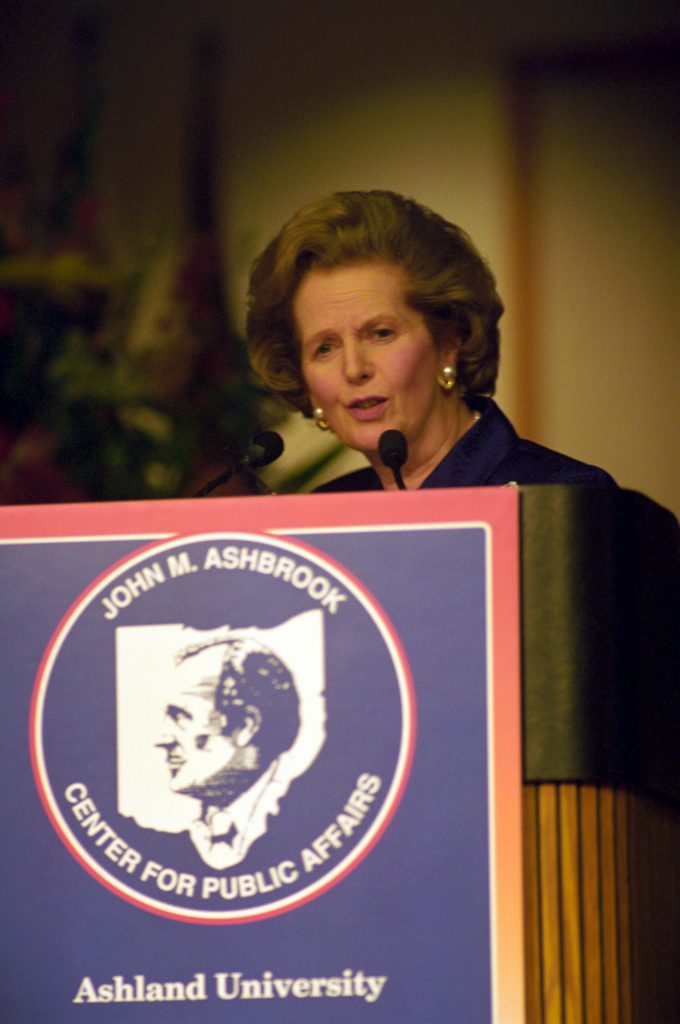Margaret Thatcher, RIP
December 24, 2020

BY STEVEN F. HAYWARD

Winston Churchill is said to have once turned down a commission for a magazine article on the topic “Can There Ever Be a Woman Prime Minister?” supposedly because the offered fee was too low, but this is doubtful, as his “going rate” for articles was well known. More likely he thought the proposal just too implausible even for his lively imagination. But had he lived to see the premiership of Margaret Thatcher, he would have had no trouble marking her out as a comparable figure to himself.
Everyone will have their favorite Thatcher epigram, such as “the problem with socialism is that sooner or later you run out of other people’s money.” What they all point to is her supreme self-confidence—a trait she held in common with both Churchill and Reagan. Nothing is so common in the public life of America or Britain than to see politicians who lack the confidence to say what they think candidly, for fear of offending too many voters. But citizens, sensing this lack of confidence on the part of their leaders, in turn, come to lose confidence and esteem for their leaders.
This may seem an ordinary or prosaic observation. And yet it is well to remember that at the time Lady Thatcher moved into Number 10 Downing Street, the common refrain of the chattering classes in the West was that Western democracies had lost their confidence and faced a dim future. (Western democracy, at that time, was a code word for the United States and Great Britain.) Only a few years before, a prominent American futurist had predicted—confidently predicted, I should add—that Great Britain would cease to exist by 1980. While Lady Thatcher was still unpacking at Downing Street, our own president told us explicitly that we had lost confidence in ourselves.
Thatcher had no doubts about what needed to be done, nor were there any doubts about the purity of her opinions. “Our aim,” she said in 1978, “is not just to remove our uniquely incompetent government from office; it is to destroy the socialist fallacies—indeed the whole fallacy of socialism that the Labour Party exists to spread.” Conservatism had never spoken with such a confident and forceful voice. Daniel Yergin and Joseph Stanislaw recall an episode when Thatcher visited the Conservative party’s research department after she became party leader in 1975, where she found a party staffer writing a paper on how the Tory party should adopt a “middle way” between left and right. Thatcher erupted. “She was not interested in refurbishing Harold Macmillan,” Yergin and Stanislaw recount. “Instead, she reached into her brief case and pulled out a book. It was [Friedrich] Hayek’s The Constitution of Liberty. She held it up for all to see. ‘THIS,’ she said sternly, ‘is what we believe.’ She slammed it down on the table and then proceeded to deliver a monologue on the ills of the British economy.” Central casting could not have produced a more compatible counterpart for Ronald Reagan.
Nor did her courage and outspokenness end when she left 10 Downing Street. Always a Euroskeptic, Thatcher warned against the hazards of the European Union. More than that, she was a champion of Anglo-American exceptionalism, remarking in 1999 that “In my lifetime all of our problems have come from mainland Europe. And all of the solutions have come from the English speaking nations across the world.” Separately she added, “We have not successfully rolled back the frontiers of the state in Britain only to see them re-imposed at a European level, with a European super-state exercising a new dominance from Brussels.”
What kind of person would say such a blunt and candid thing about the European Union (or a great many other things)? Either someone very foolish, or very confident. It’s really not hard to tell the difference, is it? The lesson of Thatcher is that the truly confident statesman proceeds from a base of firm principles. Confidence in your principles breeds courage, and through acts of courage, you gain further confidence.
The Ashbrook Center was honored to have hosted Lady Thatcher on one of her earliest visits to the United States after stepping down as Prime Minister. You can listen to her stirring speech on Constitution Day 1993 here: Margaret Thatcher, John M. Ashbrook Memorial Dinner, September 17, 1993
Steven Hayward is the Thomas W. Smith Distinguished Fellow at the Ashbrook Center, where he directs the Center’s new program in political economy, and is also the Thomas & Mabel Guy Fellow for the Center’s Master in American History and Government Program.

